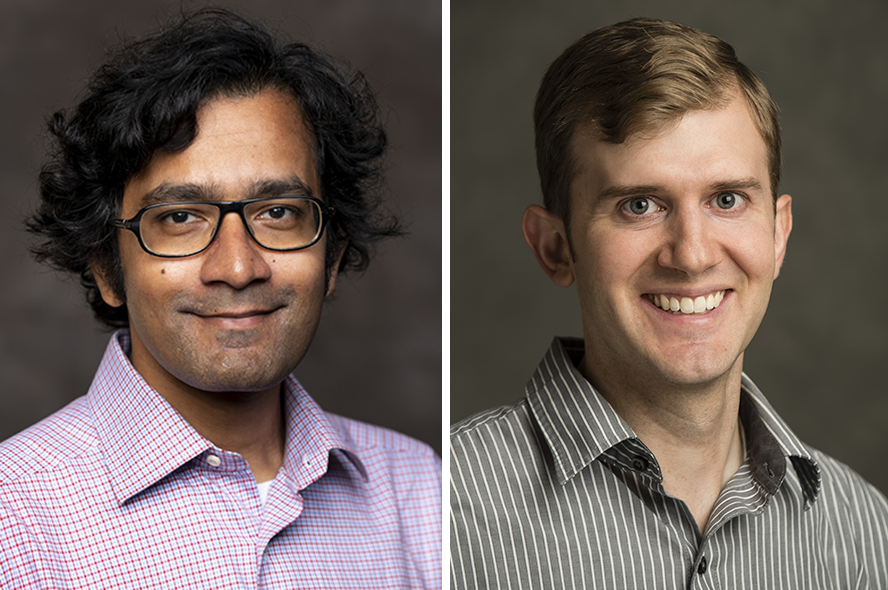Sambasivan and Van Deventer receive NSF CAREER Awards

Assistant professors Raja Sambasivan and James Van Deventer of the Tufts University School of Engineering each recently received a CAREER Award from the US National Science Foundation (NSF). The NSF Faculty Early Career Development (CAREER) Program supports exceptional early-career faculty who have the potential to drive innovative advances in research while serving as academic role models and leaders. At Tufts, Sambasivan is the Ankur and Mari Sahu Assistant Professor in the Department of Computer Science, and Van Deventer is the Bright Futures Assistant Professor in the Department of Chemical and Biological Engineering.
Sambasivan’s award funds research on cloud-based systems and the tools needed to detect and diagnose issues in them. Day-to-day life is increasingly reliant on cloud-based software services built on microservices architecture, where software or an application is composed of smaller independent services. Global enterprises like Netflix and Amazon utilize microservices architectures to fulfill user requests as customers watch movies, shop, and more. Because each user request is fulfilled by interactions between numerous microservices within the architecture, it is challenging to observe and track how that request was processed – making it difficult to manage resources and diagnose problems. Research suggests significant potential in distributed tracing, which captures graphs of the interactions between microservices as they process requests, but real-world tests have not lived up to this potential. This is because research assumes principled traces that show the causal (or happens-before) order of microservice executions and which do not suffer from data loss. In the real world, developers do not instrument their systems to show causal order and data loss is common.
In this NSF-funded project, Sambasivan proposed a novel tracing platform that would infer the data needed to make traces principled. The platform would identify the causal order of microservice executions within requests. It would allow for the expression of areas of data loss and enable systems to predict the work that could execute within those areas. Sambasivan intends to make the platform and his methods available publicly, with the ultimate goal of enhancing the software systems that have become instrumental to society across the globe. NSF CAREER Awards integrate educational efforts alongside innovation in research, and Sambasivan is already working with the MIT PRIMES program to engage high school students in research. He also plans to collaborate with outreach programs for middle school students, in addition to developing materials for a Tufts course on debugging cloud systems.
Sambasivan earned his PhD, MS, and BS in electrical and computer engineering from Carnegie Mellon University. He joined the Tufts Department of Computer Science in 2019 as the Ankur and Mari Sahu Assistant Professor. His research focuses on evolvable multi-party systems for the cloud ecosystem and tools to diagnose issues in them. He leads the Diagnosis, Observability, and Configuration of Clouds (DOCC) Lab. His work has been published in top conferences like ATC, FAST, InfoVis, NSDI, SoCC, SIGCOMM, and SIGMETRICS.
Van Deventer’s NSF-funded project seeks to establish principles of antibodies that could enable the discovery of next-generation protease inhibitors. The human immune system produces antibodies, which recognize and target foreign material like viruses or bacteria. While antibodies’ molecular recognition abilities are crucial for detecting and treating disease, they do not readily translate to blocking protease activity. Disrupting enzymes like extracellular proteases and peptidases remains a challenge for researchers, so engineering antibodies capable of disrupting protease activity would present a potential new frontier in disease diagnosis and treatment, including for cancer.
In the research funded by this NSF CAREER Award, Van Deventer plans to modify antibodies with unique amino acids, and to evaluate the impact of that modification on regulating matrix metalloprotease (MMP) activity. MMPs are associated with the development and metastasis of cancer and contribute to inflammation and infectious diseases. Van Deventer hopes to find chemistries that can interfere with enzyme functions, and to identify other use cases where modifying antibodies can produce inhibitors with unique properties. In the education element of the project, the research team plans to collaborate with Tufts’ STEM Ambassadors outreach and professional development program, and with the biotechnology program at a local vocational high school.
Van Deventer joined the Tufts Department of Chemical and Biological Engineering in 2015 after earning a PhD in chemical engineering from the California Institute of Technology and completing a postdoctoral appointment at MIT’s Koch Institute for Integrative Cancer Research. At Tufts, he was named the Bright Futures Assistant Professor in 2020. His research efforts integrate protein engineering, synthetic biology, and chemical biology to establish new strategies for treating cancer and other complex diseases. He leads the Van Deventer Lab, which focuses on disrupting enzymatic and signaling processes within the tumor microenvironment.
Learn more about Ankur and Mari Sahu Assistant Professor Raja Sambasivan.
Learn more about Bright Futures Assistant Professor James Van Deventer.
The content of this article is solely the responsibility of the authors and does not necessarily represent the official views of the National Science Foundation. Research reported in this article was supported by the National Science Foundation under the following award numbers
- 2340128
- 2339201